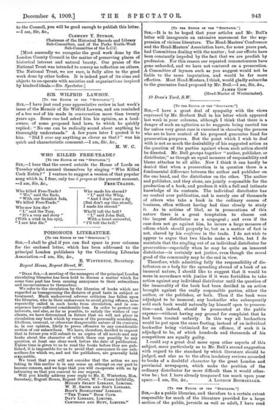[TO THE EDITOR OP THE "SPECTATOR. " ]
have a great deal of sympathy with the views expressed by Mr. Herbert Bull in his letter which appeared last week in your columns, although I think that there is a danger of such an agitation as he suggests being carried too far unless very great care is exercised in choosing the persons who are to have control of his proposed guarantee fund for prosecution purposes. But the point which I wish to deal with is not so much the desirability of his suggested action as the question of the parties against whom such action should
be directed. Mr. Bull groups together "author, publisher, or distributor," as though an equal measure of responsibility and blame attaches to all alike. Now I think it can hardly be denied that when a prosecution is in question there is a fundamental difference between the author and publisher on the one hand, and the distributor on the other. The author and publisher, and they alone, are jointly responsible for the production of a book, and produce it with a full and intimate knowledge of its contents. The individual distributor has no control over publication, and is merely one of thousands of others who take a book in the ordinary course of business, often without having had time closely to study it. As in actions of libel, so in prosecutions of this nature there is a great temptation to choose out the largest distributor as a scapegoat ; and even if the case does not go against him, he incurs a large measure of odium which should properly be, but as a matter of fact is not, shared by his confreres in the trade. I do not wish to appear to argue that two blacks make a white, but I do maintain that the singling out of an individual distributor for prosecution—especially when he may be quite an innocent distributor—is certainly not justice, even though the moral good of the community may be the end in view.
Therefore, while admitting fully the responsibility of dis- tributors as a body for the spreading abroad of a book of an immoral nature; I should like to suggest that it would be more in accordance with justice if it were forbidden to take action against any individual distributor until the question of the immorality of the book had been decided in an action brought against the really responsible parties, either the author, or the publisher, or both. Then if the book were adjudged to be immoral, any bookseller who subsequently sold such book would naturally lay himself open to prosecu- tion—and, indeed, should be prosecuted at the public expense—without having any ground for complaint that he had been treated unfairly. In this way all booksellers would be put upon the same footing, instead of an individual bookseller being victimised for an offence, if such it is adjudged to be, of which hundreds and thousands of his competitors are equally guilty.
I could say a great deal more upon other aspects of this subject, more particularly as to Mr. Bull's second suggestioii with regard to the standard by which literature should be judged, and also as to the often laudatory reviews accorded to books of a doubtful character by the great London and provincial newspapers, which make the position of the ordinary distributor far more difficult than it would other- wise be ; but I have already trespassed too much upon your






































































 Previous page
Previous page